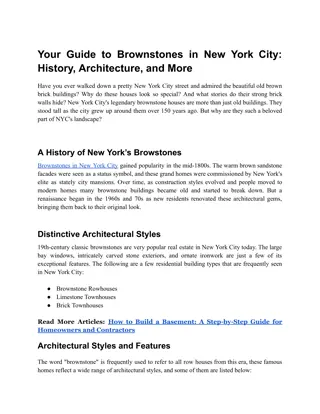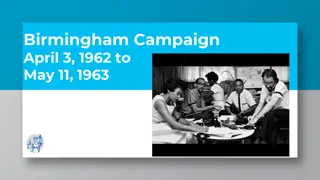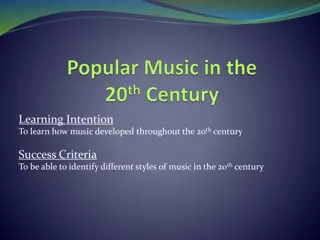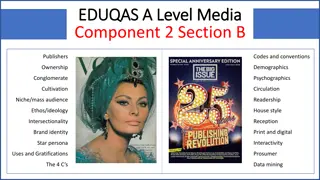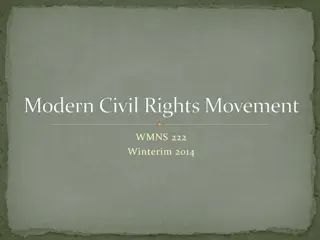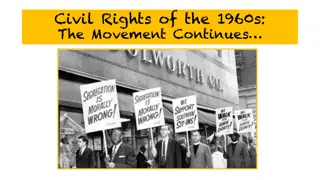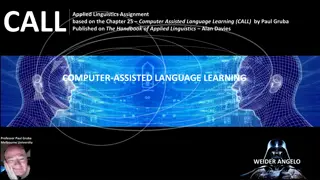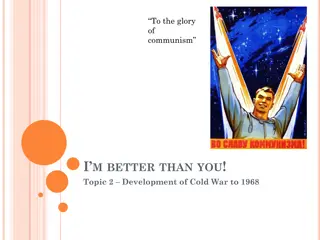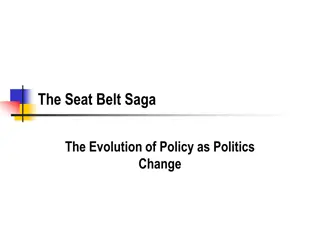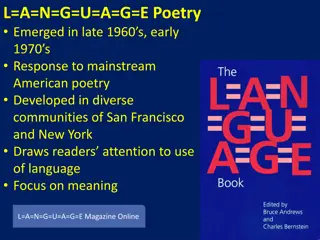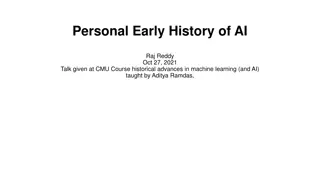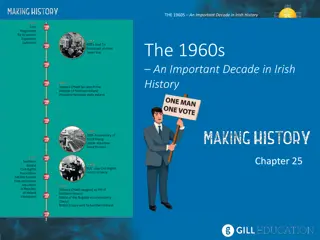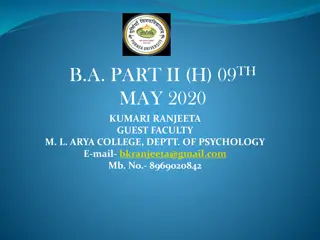Your Guide to Brownstones in New York City_ History, Architecture, and More
Brownstones in New York City gained popularity in the mid-1800s. The warm brown sandstone\nfacades were seen as a status symbol, and these grand homes were commissioned by New York's\nelite as stately city mansions. Over time, as construction styles evolved and people moved to\nmodern homes many bro
4 views • 5 slides
The Birmingham Campaign: Fighting for Racial Equality in 1960s America
The Birmingham campaign, led by Dr. Martin Luther King Jr. and the SCLC, was a pivotal moment in the civil rights movement, aiming to end racial inequality through nonviolent protests and peaceful demonstrations. The efforts led to significant progress in desegregating public facilities and promotin
5 views • 8 slides
Evolution of Operating Systems: From Mainframe Computers to Unix
Before the 1950s, users interacted directly with mainframe computers without an operating system, debugging using control panels. The transition to writing programs in symbolic languages led to the need for specific drivers. Run queues and operator-assisted job submissions marked this era. The first
0 views • 41 slides
Theoretical Issues in Psychology: Philosophy of Science and Mind
Exploring the philosophy of science in psychology, this content delves into key concepts such as positivism, logical positivism, the Vienna Circle, and the scientific process according to positivists. It discusses influential thinkers like Wittgenstein, Popper, Kuhn, and Feyerabend, shedding light o
3 views • 35 slides
Evolution of Music: Exploring 20th Century Styles
Discover how music evolved throughout the 20th century, tracing its development from genres like Blues, Spiritual, Jazz, Big Band/Swing, Rock 'n' Roll, and Pop. Explore the origins and influences of each style, from the improvisational roots of Blues to the iconic sounds of Rock 'n' Roll and the ris
0 views • 13 slides
International Solidarity Movements of the Black Panther Party and Vietnamese Liberation Front
Explore the historical connections and international alliances between the Black Panther Party and the Vietnamese Liberation Front, highlighting key events and figures such as Bobby Seale, Eldridge Cleaver, Huey P. Newton, and Nguyen Thi Dinh. Discover the shared activism, cultural exchanges, and ef
0 views • 8 slides
A Look into Adrienne Kennedy's Play: Funny House of Negro
African-American dramatist Adrienne Kennedy's first produced play, "Funny House of Negro," explores themes of race, identity, and self-hatred through the character Sarah's hallucinatory subconscious. Set in the 1960s, the play embodies a revolutionary portrayal of the black female experience. With a
0 views • 15 slides
Social and Political Turmoil in 1960s Australia: A Snapshot
The 1960s in Australia were marked by significant political and social upheaval. Young people challenged traditional values, women fought for equal rights, and citizens protested against issues like the Vietnam War and racism. The era saw a push for change and reform, with pivotal events such as the
0 views • 10 slides
The Growing Issue of Waste Generation
Solid waste, including discarded materials like garbage and refuse, is piling up rapidly, with the US alone generating over 10 billion metric tons annually. The trend of single-use products has exacerbated the problem, leading to a doubling of waste production per American since the 1960s. Disposal
0 views • 23 slides
Exploring Transformational Psychology Through History and Tradition
Transformational psychology delves into the spiritual and emotional transformation required for understanding psychology in the context of faith and relationship with God. It contrasts naturalistic approaches with the spiritual foundation, emphasizing the importance of combining science and psycholo
3 views • 17 slides
Overview of Media Studies Disciplines and Historical Development
Media studies is a multidisciplinary field that explores the content, history, and effects of various media, with roots in the relationship between media and culture. Originating in the 1920s, media studies draws on traditions from social sciences and humanities, incorporating theories from discipli
9 views • 18 slides
Evolution of Environmental Impact Assessment (EIA) and its Significance
EIA began in response to environmental crises in the 1960s due to population growth, industrialization, and urbanization. Developing countries also face severe environmental challenges, necessitating EIA adoption. The history and reasons for EIA implementation are outlined, emphasizing the global im
3 views • 49 slides
Evolution of the Magazine Industry: Trends and Challenges in Media Landscape
The magazine industry has undergone significant transformations since the 1960s, with major shifts in publishers, readership preferences, and the rise of digital platforms. Today, major publishers still dominate, but niche magazines with unique identities are thriving. Key theories like semiotics, r
0 views • 25 slides
History of Islamic Schools in the US: Lessons and Legacy
Explore the evolution of Islamic schools in the US, from community initiatives in the late 1960s to the establishment of the first schools in the late 70s and early 80s. Discover the continuous efforts to raise a generation of compassionate, faithful, and learned Muslims through institutions like th
1 views • 39 slides
Introduction to Virtualization: Concepts and Evolution
Virtualization allows running multiple operating systems on a single physical system, optimizing hardware usage and enhancing flexibility. It can be achieved through different architectures like Hosted and Bare-Metal, with examples including VMware and Xen. The history of virtualization traces back
0 views • 45 slides
Evolution of Operating Systems over the Decades
Operating systems have evolved over the past 50 years through distinct phases, from the early history of primitive machines in the 1940s and 1950s to the development of batch processing systems in the 1960s and multimode time-sharing systems in the 1970s. The 1980s marked the era of personal computi
0 views • 24 slides
Significant Events of the Modern Civil Rights Movement
The Modern Civil Rights Movement in the 1950s and 1960s was marked by pivotal events that challenged segregation and discrimination in the United States. Key moments such as the Brown v. Board of Education ruling in 1954, the tragic murder of Emmett Till in 1955, Rosa Parks' defiant act sparking the
0 views • 17 slides
Civil Rights Movement of the 1960s: A Historic Journey
The Civil Rights Movement of the 1960s was a pivotal time in American history marked by significant events such as the Freedom Riders, University of Mississippi integration, Birmingham Campaign, March on Washington, Freedom Summer, Civil Rights Act of 1964, Selma to Montgomery March, and the emergen
0 views • 12 slides
Evolution of Computer-Assisted Language Learning: A Historical Overview
Delve into the evolution of Computer-Assisted Language Learning (CALL) from the mainframe era at Stanford University in the 1960s to the introduction of personal computers in the 1980s and the internet era of the 1990s. Explore key developments, such as the shift from mainframe to PC, the growth of
1 views • 9 slides
The Evolution of Afghan Women: A Journey Through History
Delve into the story of Afghan women, tracing their experiences from the freedom of the 1960s to the oppression under the Taliban regime and the struggles for rights in the post-Taliban era. Witness the transformation of Afghan women's lives through the decades, highlighting their resilience, challe
1 views • 18 slides
Evolution of Chemical Technicians in ACS: A Historical Overview
The history of chemical technicians within the American Chemical Society (ACS) is traced from the early formation of committees to the advancement of technician roles in the workplace. The involvement of committees such as Committee on Technician Activities (CTA) and Committee on Technician Educatio
1 views • 18 slides
APL - A Functional Language with Array Paradigms
APL, named after the book "A Programming Language Paradigms," is a functional language with a focus on array manipulation. Developed in the 1960s by Kenneth E. Iverson, it has had a significant impact on the development of spreadsheets and computer math packages. APL operates with chains of monadic
0 views • 11 slides
Evolution of Applied Ethics in Philosophy
Philosophy, known as the love for wisdom, involves seeking fundamental truths about existence and relationships. In the 1960s and 70s, a shift towards applied ethics emerged as philosophers like Peter Singer emphasized making philosophical discourse accessible to laypersons. This shift was met with
1 views • 12 slides
Evolution of Relay Services for Deaf and Hard of Hearing Individuals
The history of relay services for the deaf and hard of hearing dates back to the 1960s in the USA. Three pioneering deaf men played a significant role in establishing the first successful deaf telephone network, leading to the development of relay services as we know them today. This evolution enabl
0 views • 29 slides
Fly Fishers International: Preserving Fly Fishing Legacy and Conservation Efforts
Fly Fishers International is an international non-profit organization dedicated to supporting, enhancing, and preserving fly fishing opportunities through environmental stewardship, education, and conservation efforts. With a history dating back to the 1960s, they focus on educating individuals in c
0 views • 28 slides
Challenges and Efforts for Steelhead Recovery in Salinas River Watershed
Steelhead in the Salinas River watershed have faced a historic lack of documentation and a rapid decline since the 1960s. The current status indicates a threat to their existence, with various factors contributing to their decline. Issues such as water quality, barriers to passage, and human activit
1 views • 11 slides
America in the 1960s: Soul, Beauty, and Empowerment
The 1960s in America was a decade marked by significant social and cultural movements. Icons such as Martin Luther King Jr., Malcolm X, and Muhammad Ali played pivotal roles in advocating for civil rights and empowerment. The era also saw the rise of soul music pioneers like Sam Cooke and Marvin Gay
0 views • 15 slides
Analysis of Ideology in Thomas Pynchon's "The Crying of Lot 49
This analysis delves into the story and ideology in Thomas Pynchon's novel "The Crying of Lot 49". The plot follows Oedipa Maas as she investigates the mystery of Tristero, a secret postal service. Set in California during the 1960s, the novel reflects the societal context of America during the Cold
0 views • 15 slides
The Cold War Rivalry: 1950s-1960s Espionage and Arms Race
The period from the 1950s to the 1960s was marked by intense competition between the Soviet Union and the US in the realms of espionage, space exploration, and nuclear armament. The Cold War rivalry led to significant advancements in technology and heightened tensions, culminating in key events like
0 views • 7 slides
The Seat Belt Saga: Evolution of Policy in Politics Change
The Seat Belt Saga explores the evolution of seat belt regulations in the United States, tracing the influence of popular concern, interest groups, government agencies, and legal developments from the 1960s to the 1980s. The story reflects how laws are shaped by a complex interplay of public sentime
0 views • 14 slides
Post-War Reflections: Voices and Identities of the 1950s and 1960s
Exploring the themes of post-war literature from the 1950s and 1960s, this analysis delves into the tensions, crises, and identities shaped by the era. Writers of the time grapple with finding a voice that reflects the uncertainty of a changing world order, encompassing disillusionment, anger, and i
0 views • 16 slides
Recovering Subterranean Archives: Unearthing South African Cultural Heritage
This project focuses on recovering, repatriating, and reinserting South African cultural artifacts that were suppressed during the oppressive 1960s era. By excavating underground cultural works and incorporating them into curricula, the aim is to heal fragmentation and reclaim lost narratives, espec
0 views • 6 slides
L=A=N=G=U=A=G=E Poetry Movement of the Late 1960s and 1970s
The L=A=N=G=U=A=G=E poetry movement emerged in the late 1960s and early 1970s as a response to mainstream American poetry, focusing on diverse communities in San Francisco and New York. This avant-garde movement emphasized the use of language, drawing readers' attention to the nuances of meaning. No
0 views • 6 slides
1960s Slang: Words and Phrases That Shaped a Generation
Delve into the fascinating world of 1960s slang, where words like "chill," "cool," and "groovy" became iconic expressions. Discover the distinct language that defined a generation, still resonating in modern speech. From "Chinese fire drill" to "far out," these colorful phrases reflect the vibrant c
1 views • 9 slides
Civil Rights in the 1960s: Key Events and Figures
Explore the pivotal moments of the Civil Rights movement in the 1960s, including sit-ins, Freedom Rides, the struggles at Ole Miss and Birmingham, and the impactful march in Alabama. Witness the courage and determination of activists fighting for equality and justice during this transformative era o
1 views • 10 slides
The Nixon Administration: Politics and Economics in the 1960s
The Nixon Administration in the 1960s appealed to Middle America with promises of restoring order and appealing to conservative values. Nixon's Southern Strategy, focus on law and order, implementation of the New Federalism program, and attempts to reform welfare systems were key aspects of his pres
0 views • 13 slides
Early History of AI: Reflections on 1960s Innovations and Projects
Explore the early history of AI through reflections on the advancements and projects from the 1960s. Delve into key developments in robotics, computer vision, knowledge engineering, speech and language understanding, and more. Learn about pioneering initiatives like The Hand Eye Project, Image Analy
0 views • 36 slides
The 1960s in Irish History: A Decade of Transformation
The 1960s marked a pivotal period in Irish history with significant changes in economic policy, education, and societal norms. The era saw the publication of the first Programme for Economic Development, the establishment of Teilifís Éireann (RTÉ), and the visit of President Kennedy to Ireland. N
0 views • 15 slides
Development of Community Psychology in the 1960s: A Historical Perspective
The development of Community Psychology in the 1960s was influenced by social and political movements such as the Civil Rights Movement, the Feminist Movement, and the deinstitutionalization of mental patients. This period saw the establishment of community-based mental health services and the birth
0 views • 9 slides
Vote for Your Favorite Baseball Stars from the 1960s
Get nostalgic and vote for your favorite baseball players from the 1960s! From legendary catchers to dominant pitchers and powerful hitters, relive the golden era of baseball with iconic players like Mickey Mantle, Hank Aaron, Sandy Koufax, and more. Choose your All-Star lineup from this star-studde
0 views • 11 slides
